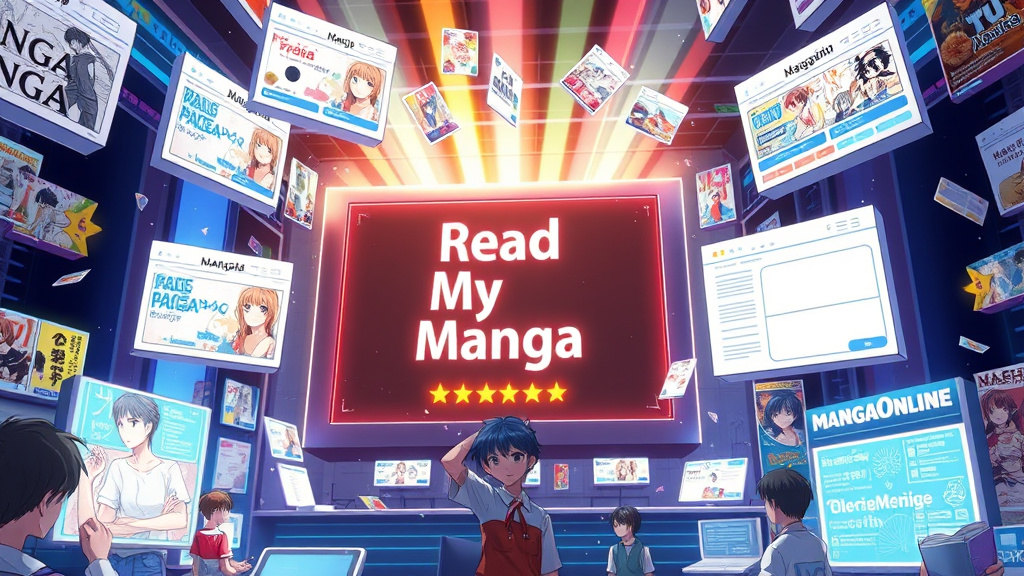In recent years, translated manga online has become a cultural phenomenon that connects fans across the globe, transcending language barriers and making Japanese manga accessible to millions. The ease of digital access allows readers to experience diverse stories and unique art styles from their homes, fueling a worldwide manga craze that shows no signs of slowing down. This article explores the evolution, ethical considerations, and future of translated manga online, highlighting its immense influence on global entertainment.
The Growing Popularity of Translated Manga Online - A Global Phenomenon
The rapid rise of translated manga online can be attributed to the digital revolution, which has transformed how content is consumed worldwide. As internet connectivity improves and mobile devices become ubiquitous, fans now prefer instant access to their favorite manga titles rather than waiting for physical copies or official releases. This shift has caused a surge in online communities, forums, and platforms dedicated to sharing translated manga, fostering a sense of global camaraderie among enthusiasts. The global popularity exemplifies how manga has transcended its Japanese origins and become a shared cultural experience on an international scale.
Moreover, the variety and diversity found in translated manga have significantly contributed to its widespread appeal. From action-packed shonen and emotionally charged shojo to thought-provoking seinen and niche genres, readers can easily find stories that resonate with their personal interests. The availability of translated manga online democratizes access to a medium that was once largely limited to Japanese audiences or those with the means to purchase official translations. As a result, manga publishers and creators are increasingly aware of this global demand, which influences strategies for distribution, licensing, and even content creation.
 Hình minh họa: translated manga online – manga sex books
Hình minh họa: translated manga online – manga sex booksAccessing Your Favorite Stories - Navigating the World of Online Manga Translations
Navigating the world of translated manga online requires understanding various platforms, translation quality, and community dynamics. Many fans turn to dedicated manga websites, forums, or social media groups to discover newly translated chapters or entire series. These platforms often feature different translation styles, from more literal to localized, which can influence how an audience perceives and enjoys the story. Choosing reputable sources ensures a better reading experience, free from poor translations or malware risks, which can sometimes plague less regulated sites.
The process of finding translated manga online can also be an immersive experience into fan communities. Often, communities develop around certain genres or series, sharing insights and theories that enhance engagement. However, readers should exercise caution and prioritize legal sources where possible, as unauthorized translations may infringe on copyrights and undermine the industry. As the landscape grows more sophisticated, platforms providing official translations aim to offer high-quality, easily accessible manga, combining convenience with respect for creators’ rights.

Legality and Ethics in the Online Manga Translation Landscape
The legality surrounding translated manga online is complex and often contentious. Fan translations—commonly known as scanlations—operate in a legal gray area, operating without the permission of copyright holders. While many fans view these translations as a way to promote manga and connect with international audiences, they can also threaten the financial stability of creators, publishers, and licensors who rely on official sales and licensing fees. Ethical considerations revolve around respecting intellectual property and supporting original content creators through legal channels.
Fortunately, the industry is gradually adapting to this new landscape by launching official digital platforms that offer translated manga online with full copyright compliance. These platforms aim to provide a legal avenue for fans to enjoy manga in their preferred language while ensuring creators are compensated for their work. Promoting awareness around the importance of supporting official releases can help sustain the industry. Ultimately, finding a balance between fan enthusiasm and respecting legal boundaries is crucial for the robust growth of manga globally.
The Impact of Fan Translations on the Manga Industry
Fan translations have historically played a significant role in expanding manga’s international reach, often serving as the first exposure many non-Japanese readers have to new series. While fan translations have generated enthusiasm and increased demand for official releases, they have also posed challenges for manga publishers. Unauthorized translations can inadvertently diminish sales or discourage publishers from licensing certain titles, creating tensions within the industry. Conversely, some publishers have acknowledged the role of fan communities in building a global reader base and are exploring collaborations to meet this demand legally.
The influence of translated manga online extends beyond distribution; it has impacted marketing, fan engagement, and even the creative process. Some manga creators have reported that fan translations motivate them, showcasing the widespread enthusiasm and potential for international success. However, the industry recognizes the need to regulate and support official translation efforts to ensure consistent quality and legal integrity. Striking this balance is essential for nurturing a thriving manga ecosystem that benefits both creators and fans worldwide.
Quality Control in Translated Manga - Ensuring Accurate and Engaging Reads
One of the most critical aspects of translated manga online is maintaining high translation quality to preserve storytelling integrity. Poorly translated manga can distort character personalities, dilute plot nuances, or introduce inaccuracies that diminish the reader experience. Professional translators invest significant effort into capturing the tone, humor, and cultural references of the original work, which is vital for engaging and authentic storytelling. Fans and platforms must prioritize quality control through careful editing and collaboration with the original rights holders to deliver accurate, enjoyable translations.
Advancements in translation technology and community-driven quality checks have improved the standard of translated manga online. Many reputable platforms now employ teams of editors, proofreaders, and linguistic experts to ensure consistent excellence. Additionally, feedback mechanisms allow readers to flag errors or suggest improvements, fostering a culture of continuous enhancement. Ultimately, the goal is to deliver seamless, immersive experiences that respect the creator’s vision while engaging diverse international audiences.
Top Websites and Platforms for Reading Translated Manga Online - Legal and User-Friendly Options
When exploring translated manga online, choosing legitimate platforms is crucial to support the industry and ensure safety. Many websites and apps now offer extensive selections of officially licensed manga, often with features like customizable reading modes, offline access, and multilingual options. Services like VIZ, Kodansha, and Shonen Jump are prime examples, providing high-quality translations directly from the publishers. These platforms typically require subscriptions or one-time payments, ensuring creators are fairly compensated while offering a reliable reading experience free from malware or intrusive ads.
In addition to official sites, several well-regarded aggregators and community platforms curate ethically sourced manga. Websites like Mangamo and ComiXology are dedicated to digital manga distribution, often collaborating with publishers to provide the latest chapters legally. These platforms are user-friendly, accessible across devices, and prioritize reader safety, making them ideal for newcomers and avid fans alike. Embracing legal options helps foster the sustained growth of manga, ensuring that creators and publishers receive their rightful support.
The Evolution of Scanlation Groups - From Hobbyists to Professionals
Scanlation groups, once primarily volunteer-driven hobbyist collectives, have evolved into a complex ecosystem of creators and professionals with significant influence in the manga scene. Originally, these groups aimed to make manga more accessible to non-Japanese speaking fans, often working anonymously or in loosely organized teams. Over time, some groups adopted more structured approaches, improving translation quality, timing, and release consistency, which attracted larger audiences. This evolution hints at the potential for digital fandoms to grow into semi-professional ventures, which raises questions about ethical boundaries and industry relations.
The transformation underscores a broader shift in how fan engagement is perceived and cultivated. Some scanlation groups now operate with clearer boundaries or collaborate with official licensors, aiming to reduce unauthorized translations. Others continue to function outside legal frameworks, prompting ongoing debates about intellectual property and fan contributions. The future may see a blending of fan passion and industry professionalism, where unofficial efforts contribute to a thriving manga culture without undermining creator rights.
Supporting Manga Creators - How to Consume Translated Manga Responsibly
Supporting manga creators through responsible consumption is essential for the sustainability of the industry. As fans of translated manga online, choosing official sources over unauthorized sites directly impacts the livelihoods of authors and illustrators. Many official platforms enable fans to access high-quality translations legally, often with options for subscriptions, merchandise, and exclusive content that further support creators. Engaging with these services not only respects copyright laws but also encourages publishers to license a broader array of titles, bringing more diverse stories to the global stage.
Beyond purchasing official releases, fans can also participate in promoting manga through social media, fan art, and attending conventions or events. These activities help maintain a vibrant community that values and appreciates the hard work behind each manga. Ultimately, fostering awareness about legal and ethical consumption practices ensures that the manga industry continues to flourish, inspiring new generations of artists and storytellers worldwide.
Challenges and Opportunities in the Translated Manga Market
The translated manga online market faces numerous hurdles, including copyright concerns, language authenticity, and supply chain issues related to licensing. As demand grows unabated, balancing the interests of fans with the rights of creators is increasingly complex. Moreover, the digital nature of online manga makes it easier for unauthorized translation efforts to flourish, complicating enforcement. However, these challenges also present opportunities: increased collaboration between publishers, technology-driven translation tools, and global marketing strategies can revolutionize how manga reaches international audiences.
Innovation offers promising possibilities for expanding access. Companies are exploring AI-based translation and adaptive localization techniques to deliver quicker, more accurate translated manga online. Additionally, emerging markets and digital-first distribution platforms open pathways for cultural exchange and economic growth. Investing in stewarding legal translation efforts provides a sustainable route for industry growth, ensuring that passionate fans can enjoy manga without harming original creators’ rights.
Future Trends in Online Manga Translation and Distribution
The future of translated manga online appears poised for exciting developments, driven by technological advancements and changing consumer habits. Artificial intelligence and machine learning are expected to enhance translation speed and accuracy, making translated manga online more accessible than ever before. Simultaneously, the push for legal, licensed content will likely intensify, pushing companies to innovate with flexible subscription models, regional exclusives, and native-language offerings that serve a global audience.
Furthermore, digital platforms will probably become more integrated with social media, allowing fans to interact directly with artists and publishers, creating a more dynamic manga ecosystem. This engagement can foster new formats such as interactive manga, virtual reality experiences, or exclusive live events, transforming how stories are told and enjoyed. As industry players recognize the importance of cultural sensitivity and inclusivity, future trends will likely focus on diversifying content, encouraging local talent, and building sustainable, ethical global communities centered around manga.
Conclusion
In summary, translated manga online has revolutionized the way fans worldwide access, enjoy, and engage with manga, fostering a vibrant, global community. From its roots in fan communities to burgeoning official digital platforms, this phenomenon highlights both the opportunities and challenges of the digital age—balancing passion, legality, and quality. As technology advances and cultural boundaries continue to blur, the manga industry is evolving into a more inclusive and innovative space that promises exciting growth while emphasizing the importance of supporting creators ethically and sustainably.





